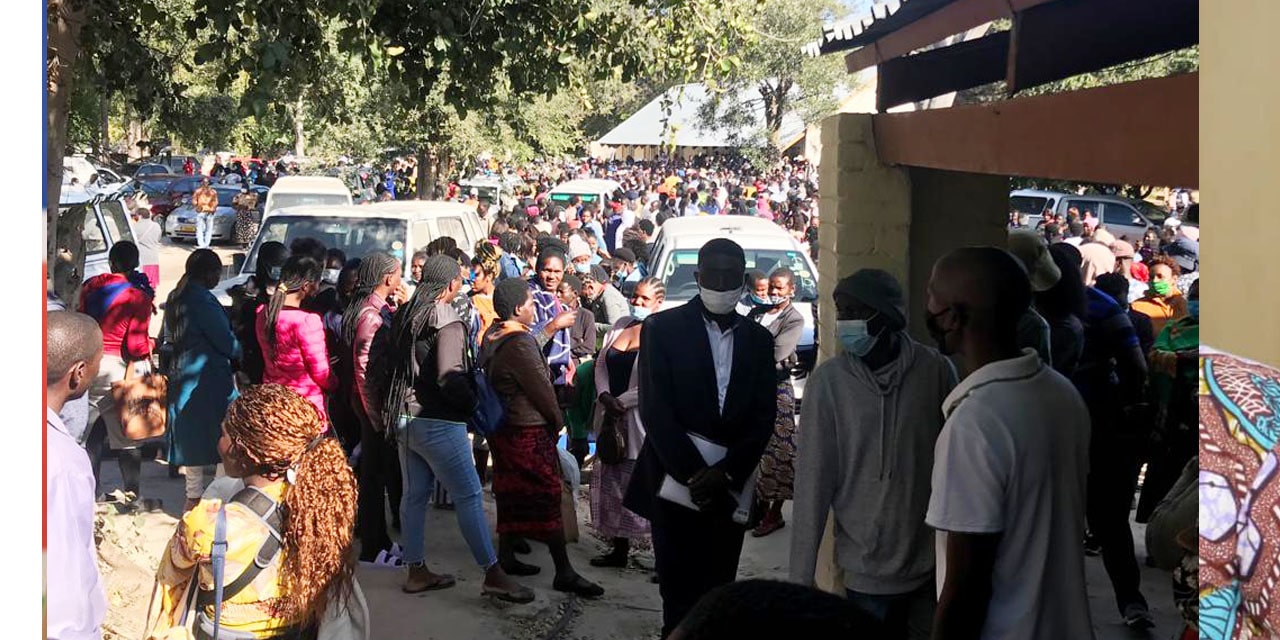Obrein Simasiku
There was havoc and chaos yesterday at the Directorate of Agriculture in the Zambezi Region when over 5000 jobseekers descended at the offices, hoping to secure a place among the 48 advertised position at the Directorate of Veterinary Services.
The region’s unemployment rate stands at 37.68 percent, against the national broad unemployment of 33.4 percent, according to the 2018 Namibia Statistic Agency Labour Force Survey.
Thousands from all corners of the region flocked to the town of Katima Mulilo as early as they could, hoping they will be selected as one of the casual workers to work on a vaccination programme for the Ministry of Agriculture, Water and Land Reform in the region.
The ministry last month advertised the positions, which are set to run for a duration of 3 months, in which it intends to employ 48 temporary workers who will be responsible for livestock vaccination and ear-tagging. “The system they used here was of ballot papers written Yes/No. In as much as this selection criteria seems fair, we are not entirely happy because it disadvantages some of us with qualifications related to the fields. How can they let more than 5000 people come and fight for 48 positions, they should have improved on their shortlisting system, as now this was a waste of people’s time and money,” bemoaned a resident of Katima Mulilo, Mpambo Sanjahi.
Sanjahi lost out on the pick, as she picked a NO ballot. She was number 106 on the application list. “Others went back because they were at the bottom of the list, as they needed to return to the village, as hope was lost at the onset. These are the people whose names were falling above 2000,” she added.
The residents, suggested that in future the ministry use a shortlisting process, so that those not qualifying can be eliminated to save people time and money. Also, they said, some of these positions should first be given to unemployed graduates who are languishing in the streets.
According to the advert the ministry’s requirement were that to be eligible, one should be a Namibian residing in Zambezi region, self-motivated with team work spirit, physically fit and energetic; no criminal record as well as willing to accept non-permanent, non-skilled remuneration packages.
Basic knowledge in cattle handling, pet vaccination, previous volunteer with veterinary services, were other added advantageous conditions.
“How can you compete with someone who never went to school just because they have an identity card and beng a Namibian citizen. At least the ministry was supposed to reserve some post for us,” further stressed Sanjahi, who holds a diploma in Animal Health from the University of Namibia.
Windhoek Observer is informed that, there were three boxes marked, San and Disabled, Non-Experienced and Experienced, seemingly that the 4 posts were spread across, meaning in each there are 16 prospective candidates. The selection process is likely to continue tomorrow.
Namibia Labour Force Survey of 2018, conducted by the Namibia Statistics Agency (NSA), states that, the overall broad unemployment rate for Namibia is 33.4 percent, which is a slight decrease of 0.6 percentage compared to 34 percent in 2016. The figure also shows that urban unemployment has increased by 3.1 percent while rural unemployment decreased by 5.7 percent.
“Hence, the slight national increase of 0.4 percent in the unemployment rate can be attributed to the decrease of 5.7 percent in rural unemployment. Similarly, the result further shows that in 2018, unemployment rate was higher amongst females (34.3%) as compared to their male counterparts (32.5%),” states the reports.




